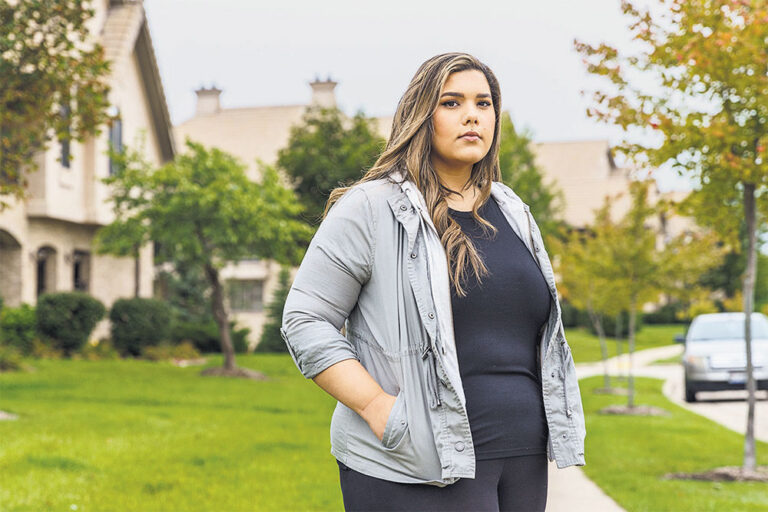WISCONSIN: The Uncommitted Could Make All the Difference
By Kay Nolan
Oct. 17, 2020

Senator Kamala Harris at an Alpha Kappa Alpha sorority gala in 2019. Ms. Harris became a member of A.K.A. as an undergraduate at Howard University.
WAUWATOSA, Wis. — Andrea Ruffier is one of the undecided voters who could help determine the winner in Wisconsin, a state both Mr. Trump and Mr. Biden see as a key to victory.
“I’m really unexcited to have to go the polls this year,” said Ms. Ruffier, 26, who lives in Oak Creek, a suburb of Milwaukee, and was shopping in Wauwatosa
on Wednesday. “I know I’m going to vote, but I haven’t decided which way.”
Ms. Ruffier, who described herself as “conservative economically” but “toward the left” on social issues, said her top concerns were women’s health rights; improving K-12 education; and helping people out of poverty. But she said she didn’t know either candidate’s stance on those issues because she gets turned off by speeches and politi-cal ads that focus on criticizing opponents and name-calling.
“I care about the person run-ning and their ideas,” said Ms. Ruffier, who works as a day trader and said she didn’t trust political parties. “Trump, as a person, is very difficult to like, with the things that he says, but Biden, I feel, is going to be like a puppet and not really have his own ideas.”
A Marquette University Law School Poll published Wednesday found that more than 10 percent of likely voters in Wisconsin had not committed to either Mr. Trump or Mr. Biden. Four percent said they would vote for the Libertarian Party candidate, Jo Jorgensen.
Mr. Biden had the support of47 percent of likely voters in the poll, while 43 percent said they would vote for Mr. Trump — a difference within the poll’s margin of error.
The results suggest that in Wisconsin, a state Mr. Trump won in 2016 by less than one percentage point, independent and undecided voters could make the difference.
“Many independents — over 20 percent — say they don’t know enough about Joe Biden yet,” said Charles Franklin, director of the Marquette poll.
Among them is Matt Kopsi, 35, an insurance manager from Greenfield, another Milwaukee suburb. “I’m really not familiar with what his whole platform is,”
he said of Mr. Biden, adding, “He seems to blame Trump for things that are out of his control.”
“I’ve voted both ways. I really don’t care about the party system — I think it keeps us more divided than anything,” Mr. Kopsi added. “I voted for Obama, but I think I’ll vote for Trump again this time.”
Wisconsinites have been deluged lately with as many as 12 ads about the presidential campaign per local TV newscast.
Though Democrats and allied groups slightly outspent their Republican counterparts on TV and radio in Wisconsin in the past week, pro-Trump ads appeared to outnumber pro-Biden ads on recent news broadcasts.
Many ads supporting the president claimed that Mr. Biden was “silent” on supporting the police or addressing violence, and was “anti-gun.” (Mr. Biden has called for more funding for community policing and has condemned rioting, looting and other violence.)
Ads supporting Mr. Biden promoted his promises to ensure health care access, protect Social Security and Medicare, fight climate change and “do what we should have done from the beginning” to mitigate the coronavirus pandemic.
For Courtney Bode, 37, a registered nurse from Milwaukee and an independent voter, Mr. Trump’s “mismanaged coronavirus response” has settled her vote for Mr. Biden. “I do feel
Biden has come out with a strong stand on that,” she said.